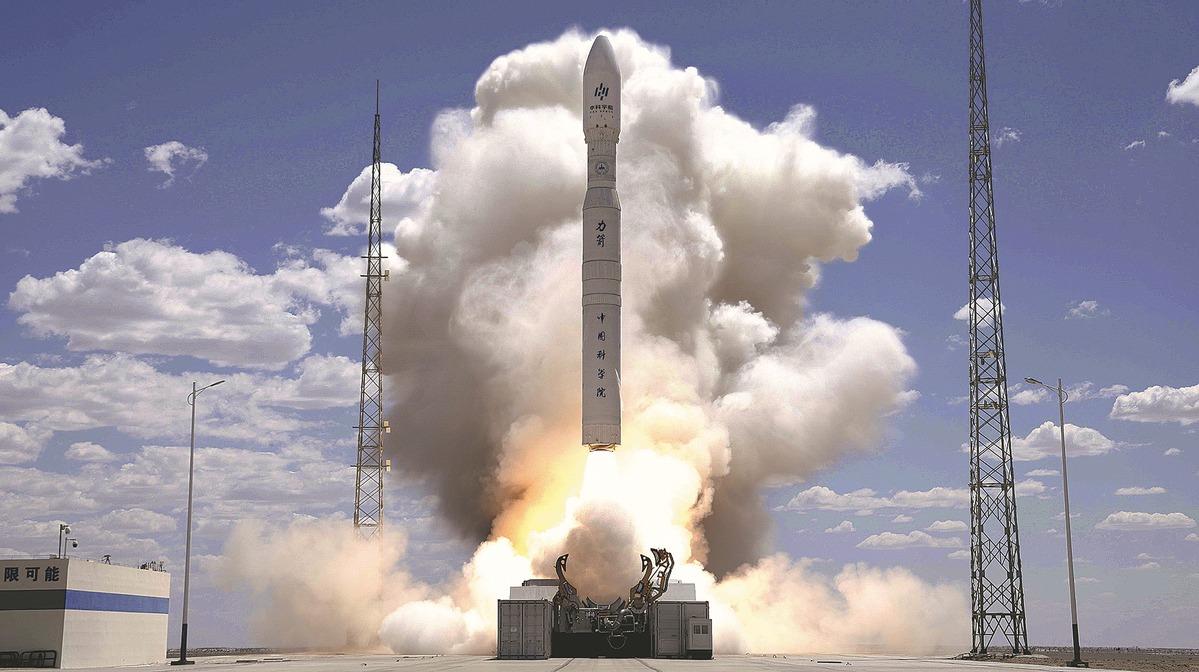Southern metropolis seen as ideal site because of its manufacturing prowess
 A ZK 1A carrier rocket is launched at the Jiuquan Satellite Launch Center in northwestern China on Jun 7, 2023 to transport a total of 26 satellites into space. (PHOTO PROVIDED TO CHINA DAILY)
A ZK 1A carrier rocket is launched at the Jiuquan Satellite Launch Center in northwestern China on Jun 7, 2023 to transport a total of 26 satellites into space. (PHOTO PROVIDED TO CHINA DAILY)
CAS Space, a Beijing-based rocket company owned by the Chinese Academy of Sciences, started construction on Saturday on a rocket engine testing facility in Guangdong province, the first of its kind in the southern economic powerhouse.
Located in Aotou township in Guangzhou, the provincial capital, the testing complex will be used in the research and development of liquid-fueled rocket engines and has been listed as one of the construction priorities in Guangdong.
A groundbreaking ceremony took place on Saturday, with the participation of local officials, executives of CAS Space and representatives from construction contractors.
The complex will be capable of carrying out comprehensive tests for liquid-fueled engines with a maximum thrust of 200 metric tons and integrated liquid-propellant propulsion systems that have a top thrust of 400 tons, according to CAS Space.
The company said the facility will also be open to domestic institutions, universities and enterprises to facilitate their work on liquid-fueled carrier rockets.
Guangzhou was chosen as the site of the testing facility because the southern metropolis features a robust manufacturing sector and a complete supply chain that can promise high production efficiency, CAS Space said.
The rocket maker said the facility will enable it to complete the full circle of testing and manufacturing liquid-fueled engines in Guangzhou to meet the rising demands of the company's rockets.
Yang Haoliang, vice-president of CAS Space, told China Daily on Sunday that his company is focused on the research and development of liquid-fueled rocket models, which are expected to receive many orders for the deployment of large satellite networks.
"There is a huge demand for rockets thanks to the construction of satellite networks. Engines are the most crucial part of a carrier rocket. We aim to make about 100 engines in Guangzhou each year in the near future to respond to the market demand," he said.
Upon its scheduled completion around the end of next year, the testing facility will mainly be used by the company's 200-ton-thrust liquid-propellant engines, according to Yang.
"Liquid-propellant engines can be reusable and will enable us to launch satellite networks or large spacecraft," he explained.
Despite being a leading global industrial base, Guangdong had little involvement in the space industry until recent years. There was no spacecraft research or production site in the province until October 2020, when CAS Space started building a rocket plant in Guangzhou's Nansha district.
The first construction phase of the 40-hectare complex finished in January, giving the company an initial annual production capacity of 30 rockets.
The second of CAS Space's ZK 1A rocket type was built at the Guangzhou plant, becoming the first rocket ever made in Guangdong. It was launched in June at the Jiuquan Satellite Launch Center in northwestern China and successfully transported 26 satellites into space.
The ZK 1A is a solid-propellant carrier rocket. Compared with solid-propellant rockets, models with liquid-fueled engines have stronger carrying capacity and efficiency.


